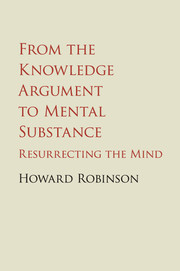Book contents
- From the Knowledge Argument to Mental Substance
- From the Knowledge Argument to Mental Substance
- Copyright page
- Dedication
- Contents
- Preface
- Book part
- Part I The power of the knowledge argument
- Part II Why physicalism entails epiphenomenalism
- Part III Arguments for mental substance
- 14 Some current arguments for substance dualism
- 15 An argument for the existence of mental substance
- 16 Plotinus,Lockeand Humeon the unity of individual substances
- Bibliography
- Index
14 - Some current arguments for substance dualism
from Part III - Arguments for mental substance
Published online by Cambridge University Press: 05 February 2016
- From the Knowledge Argument to Mental Substance
- From the Knowledge Argument to Mental Substance
- Copyright page
- Dedication
- Contents
- Preface
- Book part
- Part I The power of the knowledge argument
- Part II Why physicalism entails epiphenomenalism
- Part III Arguments for mental substance
- 14 Some current arguments for substance dualism
- 15 An argument for the existence of mental substance
- 16 Plotinus,Lockeand Humeon the unity of individual substances
- Bibliography
- Index
Summary
- Type
- Chapter
- Information
- From the Knowledge Argument to Mental SubstanceResurrecting the Mind, pp. 223 - 232Publisher: Cambridge University PressPrint publication year: 2016

